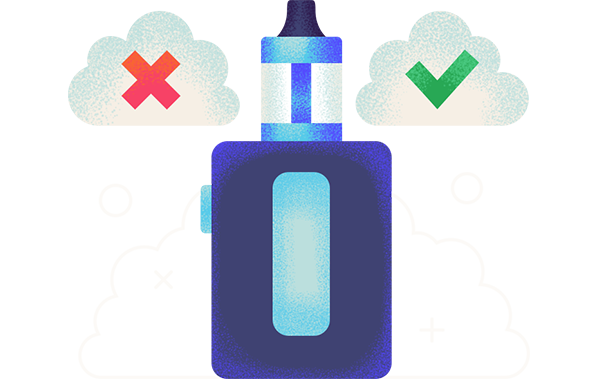Vaping, the practice of inhaling vaporized liquid as a substitute for smoking, constitutes the latest chapter in the deeply interwoven history of America, tobacco and technology. But does it represent actual progress from the public health crisis caused by cigarettes, or is this new nicotine delivery system just a more-fashionable, yet similarly harmful drain on our health – both physical and financial? It’s already a multi-billion dollar market, after all.
Although vaping has not yet been put under quite the same microscope as cigarettes, the research done to date paints a fairly consistent picture of the habit’s effects. For starters, vaping appears to be a relatively benign alternative to smoking cigarettes, which are far more dangerous given the carcinogens they contain and the chemicals that are released through the combustion of plant matter. According to a 2014 study by a team of researchers from the UK Centre for Tobacco and Alcohol Studies, “Smokers who had used an e-cigarette in their most recent quit attempt were more likely to report abstinence than those who used [a nicotine replacement therapy] bought over-the-counter.”
That, however, does not mean the practice is entirely safe. Although vaping lacks the cancer-causing elements of cigarette smoking, new data show that it’s actually more harmful to one’s immune system, inhibiting the function of 358 genes associated infection-fighting, compared to just 53 for smoking. What’s more, a 2016 study by researchers at the University of Southern California showed that 13.7% of high-school students either smoked or vaped in 2014 compared to just 9.0% who smoked in 2014, indicating that vaping is a more attractive gateway to nicotine than cigarettes.
But with all of that being said, this debate is far from settled. So in the interest of advancing the discussion, we invited a panel of public health and addiction experts to weigh in. We asked them whether vaping is unhealthy or safe (at least compared to cigarettes), and you can check out their responses below. All in all, twelve experts say vaping is safer than smoking cigarettes, six believe vaping is bad and three contend that there’s just not enough reliable data yet.
Vaping Is Safer Than Smoking
Highlights:
- “The vapor is not completely safe compared to having no vapor – it has propylene glycol and small amounts of some other toxic chemicals, mostly for flavoring. However, studies show very small amounts of harmful chemicals in the vapor compared to the very large harmful properties of burned tobacco. E-cigarette use has been shown to reduce exhaled carbon monoxide and self-reported respiratory symptoms over time. Therefore, while non-smokers should not have to be exposed to vapor, for smokers to switch to e-cigarettes would greatly reduce their exposure to toxic chemicals and particles.”- Damaris J. Rohsenow, Ph.D. // Associate Director of the Center for Alcohol and Addiction Studies, Brown University School of Public Health
- "In discussing the safety of e-cigarettes, it is important to recognize that nothing is absolutely safe; for example, prescription medicines lead to over 30,000 deaths each year in the U.S. Even over-the-counter medicines like aspirin and related pain relievers cause thousands of deaths per year. Therefore, a more relevant question is whether e-cigarettes are reasonably safe for current smokers to use in place of conventional combustible cigarettes. Based on available evidence, e-cigarettes are almost certainly far less harmful than combustible cigarettes. The U.S. Surgeon General and other experts have linked the vast majority of smoking-related disease to the combustion products of smoke, not to the nicotine per se."- Jed E. Rose, Ph.D. // Director of the Center for Smoking Cessation, Duke University Medical Center
- “Choosing between ‘safe’ or ‘unsafe’ labels for e-cigarettes misses the point. No consumer product is absolutely safe. Those terms are especially meaningless for 39 million U.S. smokers who know they should quit but have not. Smokers have been seriously misinformed about the relative safety of vapor products; only one-quarter of them know vaping is less harmful than smoking. Tragically, misinformation keeps people smoking and keeps smokers dying.”- Brad Rodu, D.D.S. // Endowed Chair for Tobacco Harm Reduction Research at the University of Louisville’s James Graham Brown Cancer Center & Senior Fellow at The Heartland Institute
- “Compared to cigarettes, there should be no debate that vaping is much safer. However, compared to breathing the air, vaping is probably riskier, although one might be able to debate this depending upon where you live these days. The concept of separating the nicotine from cigarette smoke is an old idea, but a good one, since smokers smoke for the nicotine but end up dying as a result of their repeated exposure to the many dangerous chemicals in cigarette smoke.”- K. Michael Cummings, Ph.D. // Co-Director of the Hollings Cancer Center’s Tobacco Research Program, Medical University of South Carolina
Ask the Experts
Professor of Medicine at Harvard Medical School and Director of the Tobacco Research and Treatment Center at Massachusetts General Hospital
Read More
Professor and Smith and Lucille Gibson Chair in Medicine at University of Louisville
Read More
Executive Director of Action on Smoking and Health (ASH) and FCA Ambassador at Framework Convention Alliance (FCA) for Tobacco Control
Read More
Board Member of the Head and Neck Cancer Alliance, and Associate Professor of Otolaryngology-Head and Neck Surgery, UC Davis Medical Center
Read More
Vaping Is Bad For Your Health
Highlights:
- “Listening to some e-cigarette advocates you would think that vaping was no more dangerous than inhaling purified water vapor. However, there is nothing natural about deeply inhaling a mist of propylene glycol and/or glycerin deeply into the lungs on a daily basis for years. The vaporization process involves a heating element which, especially in higher -powered advanced vaporizers, produces formaldehyde - a known carcinogen. Almost all e-juice flavors contain aldehydes, ketones, and natural extracts, which are felt to be safe when ingested. Nevertheless, the toxicity spectrum of the lung is very different from that of the gut. Many flavors, especially sweet and creamy flavors, contain diacetyl compounds which, when inhaled, are known to be a cause of serious lung disease among flavor manufacturing workers.”- Robert K. Jackler, M.D. // Principal Investigator, Stanford Research Into the Impact of Tobacco Advertising, Stanford University School of Medicine
- “Big Tobacco and its allies have been trying to obscure the emerging science on the dangers e-cigarettes pose to public health. But claims that “vaping” is a healthier alternative to cigarettes, instead of a gateway, were disproven by a recent American Journal of Public Health study that found smokers who have used e-cigarettes are less likely to cut back on cigarettes in the future than smokers who haven’t used them.”- Larry Cohen // Founder & Executive Director of the Prevention Institute
Ask the Experts
Professor of Medicine at Harvard Medical School and Director of the Tobacco Research and Treatment Center at Massachusetts General Hospital
Read More
Professor and Smith and Lucille Gibson Chair in Medicine at University of Louisville
Read More
Executive Director of Action on Smoking and Health (ASH) and FCA Ambassador at Framework Convention Alliance (FCA) for Tobacco Control
Read More
Board Member of the Head and Neck Cancer Alliance, and Associate Professor of Otolaryngology-Head and Neck Surgery, UC Davis Medical Center
Read More
The Jury’s Still Out
Highlights:
- “Vaping exclusively (without smoking any cigarettes) is almost certainly less harmful than continuing to smoke conventional tobacco cigarettes, though the data to prove this hypothesis do not yet exist because e- cigs are such new products that entered the market without regulation (until very recently).”- Nancy A. Rigotti, M.D. // Director of the Tobacco Research and Treatment Center at Massachusetts General Hospital & Professor of Medicine at Harvard Medical School
- “The safety of vaping is not well established. There is no evidence showing that vaping is safe and that it does not have any significant health effects. No well-controlled short-term or long-term studies have been conducted to evaluate the health effects of vaping. While the results of some early studies have suggested that some of the acute cardiovascular and respiratory effects seen with smoking and not seen with vaping, it is unclear whether the health risks associated with repeated and frequent vaping are minimal.”- Aruni Bhatnagar, Ph.D. // Smith and Lucille Gibson Chair in Medicine, University of Louisville
Ask the Experts
Professor of Medicine at Harvard Medical School and Director of the Tobacco Research and Treatment Center at Massachusetts General Hospital
Read More
Professor and Smith and Lucille Gibson Chair in Medicine at University of Louisville
Read More
Executive Director of Action on Smoking and Health (ASH) and FCA Ambassador at Framework Convention Alliance (FCA) for Tobacco Control
Read More
Board Member of the Head and Neck Cancer Alliance, and Associate Professor of Otolaryngology-Head and Neck Surgery, UC Davis Medical Center
Read More
Image: Jennifer Borton / iStock.







WalletHub experts are widely quoted. Contact our media team to schedule an interview.